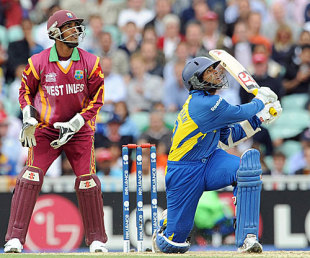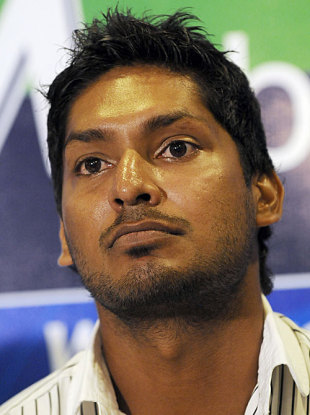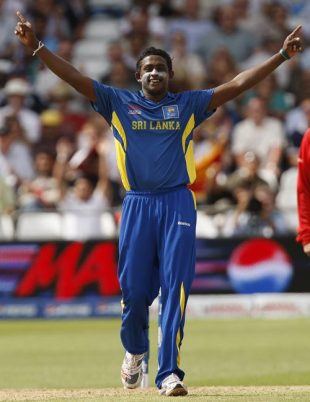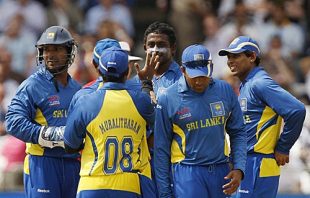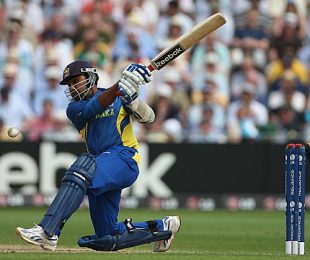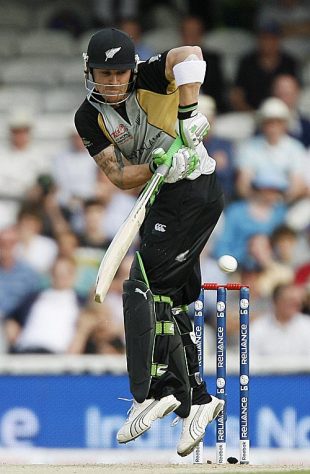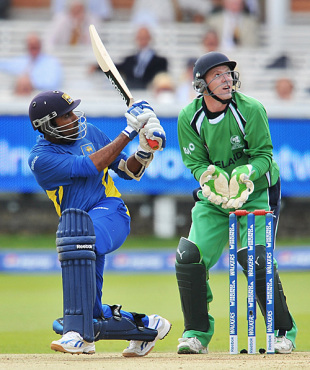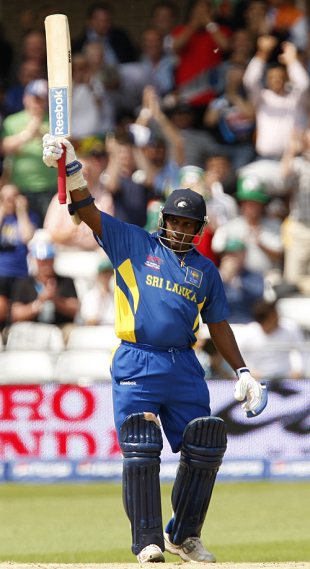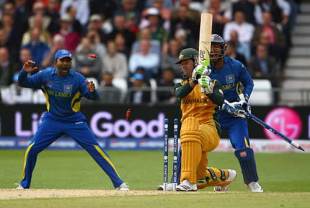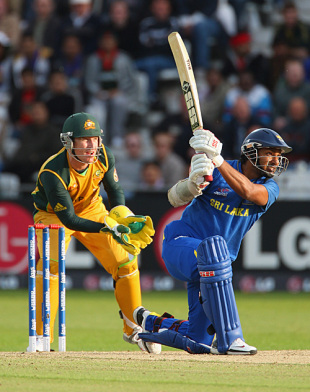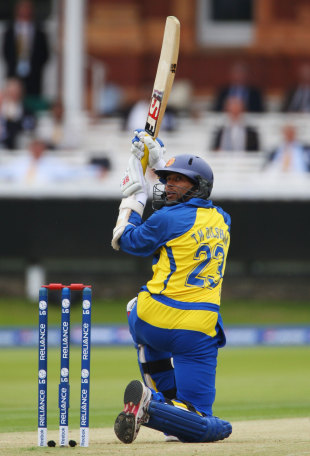
|
1 Tillakaratne Dilshan: 317 runs, average 52.83
Dilshan took over the mantle of Sri Lanka's most dangerous opener from Sanath Jayasuriya, thrilling spectators and confounding bowlers with his innovative batting. He is one of cricket's first 360-degree batsmen, using the paddle and the reverse-hit to play the ball through the toughest of angles. And then there was the scoop - an audacious shot, seemingly fraught with danger, played against the fast bowlers to send the ball over the wicketkeeper's head. He combined flair with consistency and was the tournament's top-scorer by 79 runs. His best performance was in the semi-final against West Indies, against whom his unbeaten 96 single-handedly gave Sri Lanka a defendable target.
2 Chris Gayle: 193 runs, average 48.25
Gayle played a significant role in knocking Australia out of the competition. His brutal 88 off 50 balls at The Oval, which included monstrous sixes off Brett Lee on to Harleyford Road and on top of the Bedser stand, remains one of the spectacles of the tournament. He remained dormant during the next few matches, reserving his strong performance for the semi-final, but ended up carrying his bat against Sri Lanka after receiving feeble support from his team-mates.
3 Shahid Afridi: 176 runs, average 35.20, 11 wickets, economy-rate 5.32
Afridi's progress during the World Twenty20 mirrored Pakistan's: both started disastrously but peaked at the right time. Afridi scored 5, 13 and 0 in his first three innings, though his hustling legspin remained a reliable asset throughout. Pakistan's chances of making the semi-finals, though, appeared bleak until Afridi took a spectacular catch to dismiss Scott Styris in the Super Eight game against New Zealand. He was promoted to No. 3 in the batting order and saved his best performances - two half-centuries - for the semi-final and final. He was invaluable to Pakistan for his sensible batting, incisive yet economical bowling, and for his energy in the field.
4 Kumar Sangakkara: 177 runs, average 35.40
Sri Lanka had the best batsman and the most dangerous bowling attack of the tournament but their unbeaten run until the final was presided over by the calmest of leaders. It was hard to believe that the World Twenty20 was Sangakkara's first assignment as captain. He made astute decisions, promoting Dilshan up the order, and invested in his younger players - Angelo Mathews and Isuru Udana - by giving them responsibility. He even led by performance, scoring a half-century which prevented Sri Lanka from being crushed in the final. The team Sangakkara inherited had been through torment in the last few months but they showed little of those troubles on the field.
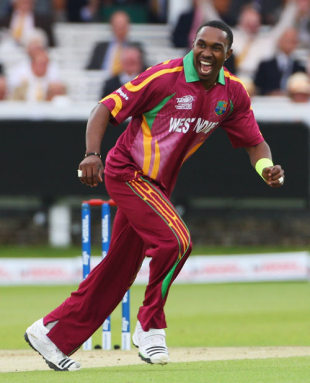
| ||
| | ||
5 Kevin Pietersen: 154 runs, average 38.50
Pietersen did not have a spectacular World Twenty20 but he made significant contributions whenever England played a match they had to win to stay in the competition. He scored 58 off 38 balls against Pakistan to ensure England qualified from Group B after losing to Netherlands, he top-scored with 46 off 27 balls in a crucial Super Eights game against India to keep semi-final hopes alive, and biffed 31 off 19 balls in England's must-win match against West Indies.
6 AB de Villiers: 186 runs, average 37.20
de Villiers took the opportunity against Scotland to blast 79 off 34 balls but also displayed the skill to thrive on the toughest pitch of the tournament. The surface at Trent Bridge for the game against India was slow and gave the spinners a lot of turn and bounce. De Villiers, however, thrived against India's spinners, top-scoring with 63 off 50 balls, to lead South Africa to a match-winning total.
7 Dwayne Bravo 154 runs, average 38.50, 10 wickets, economy-rate 8.76
Bravo played the role of back-up seamer successfully for West Indies, keeping the batsmen guessing with his mix of yorkers, slower balls and slow bouncers. He also stepped up when Gayle failed or was injured, making useful contributions in the middle-order. Bravo saved his best for India, taking 4 for 34 and scoring 66 off 36 balls to lead a superb chase.
8 Wayne Parnell: 9 wickets, economy-rate 5.71
A little over a year ago, Parnell captained his side to the final of the under-19 World Cup and was tipped as one of the next big things in South African cricket. He did not disappoint and was their best bowler in the World Twenty20. Parnell bowled with pace and accuracy during the Powerplay and the final overs - the most difficult periods for a bowler in a Twenty20 game - and still finished with an economy-rate of less than six an over. He was outstanding in the high-pressure environment of the semi-final: having conceded 14 runs in his first over, he bounced back strongly to give only 12 off his next three.
9 Umar Gul: 13 wickets, economy-rate 6.44
The highest wicket-taker of the tournament, Gul switched from operating at the start of the innings to bowling his overs at a stretch towards the end. It was a master-stroke for Gul was able to swing the old ball, something no one apart from Lasith Malinga could do, and was able to bowl yorkers at will, which made him extremely hard to score heavily off. His spell of 5 for 6 in three overs against New Zealand was the best in Twenty20 internationals but it was his second over against South Africa in the semi-final, comprising six yorkers, which underlined his value in the shortest format.
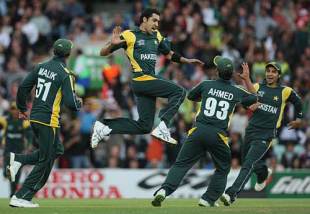
| ||
| | ||
10 Lasith Malinga: 12 wickets, economy-rate 7.14
Malinga is another yorker specialist but he added several strings to his bow during this tournament by perfecting a slow bouncer and a slow full toss. Delivered with his side-on action, the slow full toss was often not picked by the batsmen and the ball swerved away in the air to beat the bat. Brad Haddin was the first victim to have his stumps splayed in Malinga's first match and the ball brought him success throughout the tournament.
11 Ajantha Mendis: 12 wickets, economy-rate 5.50
Mendis was one of three reasons Sri Lanka were able to defend modest totals throughout the tournament but he was probably the best one. He took wickets against all opponents, except for Pakistan, and was exceptional in his first-ever outing against Australia, eliminating them from the competition with 3 for 20. He struck timely blows as well and made a habit of striking twice in an over - against West Indies, Ireland and New Zealand - to wreck run-chases just when Sri Lanka appeared vulnerable.
Twelfth men: Saeed Ajmal and Roelof van der Merwe
George Binoy is a senior sub-editor at Cricinfo
